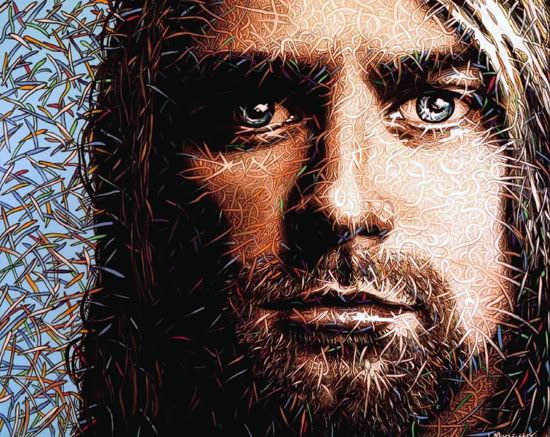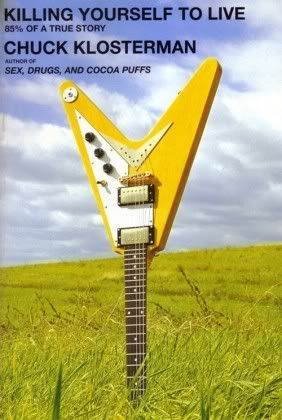FILM: Nirvana's Kurt Cobain - ABOUT A SON
FILM REVIEW - DVD RELEASE: 4/20/08
The legacy of a dead artist - a legend, a rock star - is a long shadow cast by a bright light. Dancing images on cave wall, epic rock songs - insanity's wide brush. This is the legacy of Kurt Cobain. Until now we have thought we perceived his mind and understood his art through listening to Nirvana's music. There is a ghostly and reminder of the man's brilliance and his penchant for self immolation. Tomorrow, the powerful "About a Son" movie will be made available on video. If Cobain had lived he would be 41 years-old tomorrow.
The movie is filled with the sights and sounds of Kurt's life - but for the first time ever he explains his own life. The results are remarkable.
The legacy of a dead artist - a legend, a rock star - is a long shadow cast by a bright light. Dancing images on cave wall, epic rock songs - insanity's wide brush. This is the legacy of Kurt Cobain. Until now we have thought we perceived his mind and understood his art through listening to Nirvana's music. There is a ghostly and reminder of the man's brilliance and his penchant for self immolation. Tomorrow, the powerful "About a Son" movie will be made available on video. If Cobain had lived he would be 41 years-old tomorrow.
The movie is filled with the sights and sounds of Kurt's life - but for the first time ever he explains his own life. The results are remarkable.
Biography of a Rock Sinner

Kurt Cobain's story in his own words. A Must-See DVD.
Original Artwork by Jack Morefield

Kurt Cobain's story in his own words. A Must-See DVD.
Original Artwork by Jack Morefield
In 1993, Cobain recorded 25 hours of personal footage, revelations and anecdotes with author Michael Azerrad. Some of the footage was used by Azerrad to record, "Come as You Are." Azerrad met with Cobain after "Nevermind" was released and prior to "In Utero." Complete in June, 1993 - the book does not address the last tour of Nirvana or Cobain's final weeks. The many hours of recorded audio have now been edited and compiled into the greatest biographical telling of Cobain's life.. and in his own words. It is wonderful and absolutely chilling to his his voice... to hear him tell you what's its like to be alive. "About a Son" is a highly recommended movie.
If I were to tell you that the 1989 Nirvana debut album, “Bleach”, was one of favorite records from my youth – I wouldn’t be lying. I had a copy of it on cassette long before it became available widely. By the time I got my hands on it, it was already a contemporary underground classic. I acquired the tape in ’91 from a stranger I met at a party. He left it on my car seat. I never saw him again.
There was something in the songs… I could only imagine what Nirvana would look like playing an all black stage under unforgiving bright lights. The drums and bass both plodded and exploded. The guitars wailed. Kurt was always leaning and stumbling about like a wounded scarecrow.
I guess none of this comes as a surprise… What I always knew about Kurt – and just from the songs, is that he is at his best when he’s his most vulnerable.
There was something in the songs… I could only imagine what Nirvana would look like playing an all black stage under unforgiving bright lights. The drums and bass both plodded and exploded. The guitars wailed. Kurt was always leaning and stumbling about like a wounded scarecrow.
I guess none of this comes as a surprise… What I always knew about Kurt – and just from the songs, is that he is at his best when he’s his most vulnerable.
With the recent DVD release of the "Nirvana: Unplugged" (highly recommended) and now "About A Son," our culture has marked it's hunger for all things Kurt Cobain. I have been thinking about the man and the artist recently.
I've been running concepts through my head in an effort to frame Curt's existence. For instance - put yourself in his shoes: Cobain releases one album on Subpop and then is given a major record deal right away with Geffen. Nirvana was literally on top of the world in 1991, following the release of "Nevermind." You don't have to understand the music to appreciate how awkward and strange the world must have seemed.
As illuminating as the movie is, however, "About a Son" answers only those questions which Curt wanted to address for the recorder- but it's still more insight than we have ever had before. One is left wondering, critically, if Curt is more famous for his days leading up to his death and his ultimate demise than he is for his music. (A re-invention of his entire life based on the last few days or final moments?) It's a fair question.
The culture and religion of dead rock stars is one explored in great detail in author Chuck Klosterman's stellar 2005 rock novel; "Killing Yourself to Live." I just finished it. It's a first-person telling about exploring this very concept. It's a story about music and death but, ironically, it's about musical discovery during life.
During a cross-country road trip, Klosterman - who is a senior writer at Spin magazine, attempts to understand the culture of death in rock and our fascination with fallen musicians. Obviously the story ends in Seattle, with its apparent hunger for rock star lives. The trip from coast to coast is spent listening to the author's favorite songs (and flashing back on his life) all the while we examine the "successful careers" of dead musicians who were never permitted by fate to grow old or disappoint the fans.
I've been running concepts through my head in an effort to frame Curt's existence. For instance - put yourself in his shoes: Cobain releases one album on Subpop and then is given a major record deal right away with Geffen. Nirvana was literally on top of the world in 1991, following the release of "Nevermind." You don't have to understand the music to appreciate how awkward and strange the world must have seemed.
As illuminating as the movie is, however, "About a Son" answers only those questions which Curt wanted to address for the recorder- but it's still more insight than we have ever had before. One is left wondering, critically, if Curt is more famous for his days leading up to his death and his ultimate demise than he is for his music. (A re-invention of his entire life based on the last few days or final moments?) It's a fair question.
The culture and religion of dead rock stars is one explored in great detail in author Chuck Klosterman's stellar 2005 rock novel; "Killing Yourself to Live." I just finished it. It's a first-person telling about exploring this very concept. It's a story about music and death but, ironically, it's about musical discovery during life.
During a cross-country road trip, Klosterman - who is a senior writer at Spin magazine, attempts to understand the culture of death in rock and our fascination with fallen musicians. Obviously the story ends in Seattle, with its apparent hunger for rock star lives. The trip from coast to coast is spent listening to the author's favorite songs (and flashing back on his life) all the while we examine the "successful careers" of dead musicians who were never permitted by fate to grow old or disappoint the fans.

"It's normal for someone's death to change how we recall what a celebrity was like, but the situation with Cobain is more complex; this is a situation in which a celebrity died, and many private citizens - including countless individuals who were wholly unconnected to Kurt or Seattle or grunge or even popular music - suddenly chose to remember themselves in a completely different way. Kurt Cobain didn't need to die to get integrity, because he already had it. However, his dying seemed to give total strangers a sense of integrity they had never wanted while he was alive."
- C. Klosterman, "Killing Yourself to Live".
- C. Klosterman, "Killing Yourself to Live".
After reading Klosterman's book I think I understand the music fanatic in myself just a little more. You have a little of this creature in you - although a little less, I'm sure than me. The author has convinced me that when a great man with a guitar dies he sometimes lives forever. Good, bad or indifferent... people need stories and they need heroes. I think we all want to touch the things that make us feel the most alive. Even when - in the case with Cobain - those very things are no longer with us.
"About a Son" will not change the way you feel about Cobain - it will likely just make you feel more strongly. For that reason alone it's worth watching. It's not often a late musician has another chance to change your life, again.
"About a Son" will not change the way you feel about Cobain - it will likely just make you feel more strongly. For that reason alone it's worth watching. It's not often a late musician has another chance to change your life, again.



Comments